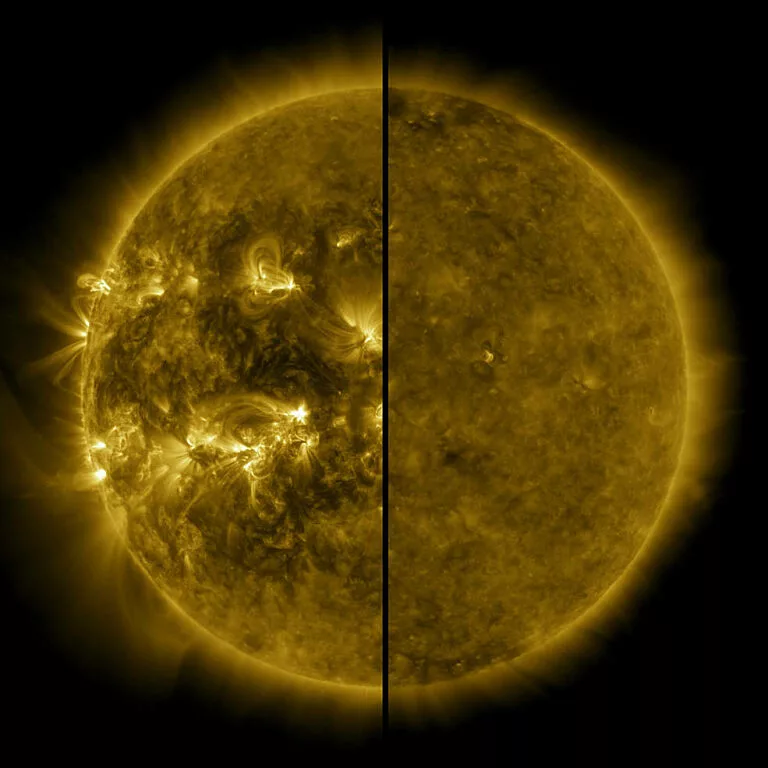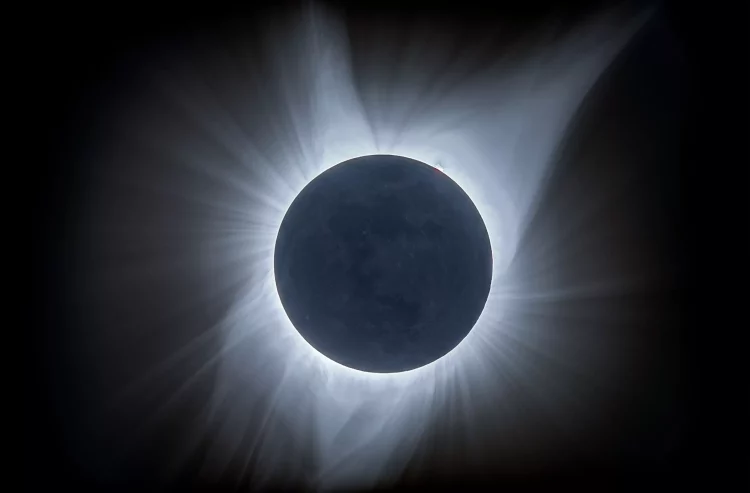The Sun, a magnificent sphere of plasma at the heart of our solar system, is far more than just a celestial body that provides daylight. It is a dynamic and complex entity whose properties and behavior have profound effects on the entire solar system, including Earth. This article delves into the multifaceted nature of the Sun, exploring its structure, processes, and significance.
I. The Sun: Basic Facts and Structure
1. Basic Facts
- Age and Composition: The Sun is approximately 4.6 billion years old and is composed mainly of hydrogen (about 74%) and helium (about 24%), with trace amounts of heavier elements such as oxygen, carbon, neon, and iron.
- Size and Mass: With a diameter of about 1.39 million kilometers (about 864,000 miles) and a mass that constitutes 99.86% of the total mass of the Solar System, the Sun is an overwhelmingly dominant presence in our cosmic neighborhood.
- Distance from Earth: The Sun is about 93 million miles (150 million kilometers) away from Earth, a distance known as an Astronomical Unit (AU). This distance is crucial for maintaining the balance of temperatures that support life on our planet.
2. Structure of the Sun
The Sun’s structure is divided into several distinct layers, each with its unique properties and functions:
- Core: The innermost layer, where nuclear fusion occurs. Temperatures in the core reach up to 15 million degrees Celsius (27 million degrees Fahrenheit). This process generates the Sun’s energy and involves the fusion of hydrogen atoms into helium.
- Radiative Zone: Surrounding the core, this layer extends from the core to about 70% of the way to the Sun’s surface. Energy from the core is transported outward through radiation, a slow process taking thousands to millions of years for photons to reach the next layer.
- Convective Zone: Above the radiative zone, this layer is characterized by convective currents. Hot plasma rises towards the surface, cools, and then sinks back down, a process that transports energy more efficiently than radiation.
- Photosphere: The visible surface of the Sun, where sunlight is emitted. The photosphere has a temperature of approximately 5,500 degrees Celsius (9,932 degrees Fahrenheit) and is the layer we typically see when we observe the Sun.
- Chromosphere: Above the photosphere, this layer is seen as a reddish glow during solar eclipses. The temperature rises from about 4,500 degrees Celsius (8,132 degrees Fahrenheit) at the base to about 25,000 degrees Celsius (45,000 degrees Fahrenheit) at the top.
- Corona: The outermost layer of the Sun’s atmosphere, extending millions of kilometers into space. Despite being the hottest layer, with temperatures reaching 1 to 3 million degrees Celsius (1.8 to 5.4 million degrees Fahrenheit), it is less dense than the lower layers. The corona is visible during a total solar eclipse and can be studied using space-based observatories.

II. Solar Phenomena and Processes
1. Solar Activity
The Sun exhibits a range of dynamic phenomena known collectively as solar activity. These include:
- Sunspots: Dark spots on the photosphere caused by intense magnetic activity. Sunspots vary in size and can appear in groups. They are cooler than their surroundings and can influence solar radiation and space weather.
- Solar Flares: Sudden and intense bursts of radiation caused by the release of magnetic energy. Solar flares can affect radio communications, GPS systems, and power grids on Earth.
- Coronal Mass Ejections (CMEs): Massive bursts of solar wind and magnetic fields rising above the solar corona or being released into space. CMEs can trigger geomagnetic storms on Earth and affect satellite operations.
- Prominences: Large, bright features extending outward from the Sun’s surface, often in a loop shape. They are anchored to the Sun’s surface in the photosphere and extend into the corona.
- Solar Wind: A continuous flow of charged particles (mostly electrons and protons) emitted from the Sun’s corona. Solar wind interacts with Earth’s magnetic field and can create phenomena such as auroras.
2. The Solar Cycle
The Sun undergoes an approximately 11-year cycle of activity known as the solar cycle, characterized by varying levels of solar activity:
- Solar Maximum: The period of greatest solar activity in the solar cycle, marked by an increased number of sunspots, solar flares, and CMEs. During this time, the Sun’s magnetic field is highly active and complex.
- Solar Minimum: The period of lowest solar activity, with fewer sunspots and reduced solar flare and CME occurrences. The solar minimum follows the solar maximum and marks the end of a solar cycle.
- Solar Cycle Variability: The length and intensity of solar cycles can vary. While the average period is about 11 years, some cycles can be shorter or longer, and their intensity can fluctuate.
III. The Sun’s Influence on Earth and Space
1. Impact on Earth
The Sun’s influence extends profoundly to Earth, affecting various aspects of our planet:
- Climate and Weather: Solar radiation drives Earth’s climate and weather systems. Variations in solar output can influence long-term climate patterns, although short-term weather is more directly affected by atmospheric conditions.
- Space Weather: Solar activity can cause space weather phenomena that affect Earth’s magnetosphere, ionosphere, and upper atmosphere. Geomagnetic storms resulting from CMEs or intense solar wind can disrupt satellite operations, communications, and navigation systems.
- Auroras: Auroras, such as the Northern and Southern Lights, are caused by the interaction of solar wind with Earth’s magnetic field. Charged particles from the solar wind collide with atmospheric gases, causing them to emit light.
2. Solar-Terrestrial Relations
- Magnetosphere: Earth’s magnetic field protects the planet from the solar wind and cosmic radiation. It deflects charged particles and traps them in the Van Allen radiation belts, which can be disturbed by intense solar activity.
- Ionosphere: The ionosphere is a region of Earth’s upper atmosphere ionized by solar radiation. It affects radio wave propagation and can be influenced by solar flares and geomagnetic storms.
- Space Exploration: Understanding the Sun’s behavior is crucial for space missions. Solar radiation, solar wind, and space weather can impact spacecraft and astronauts. Monitoring solar activity helps mitigate risks for space missions and protect technological infrastructure.
IV. Observing and Studying the Sun
1. Ground-Based Observatories
- Solar Telescopes: Ground-based solar telescopes, such as the Solar Dynamics Observatory (SDO) and the Daniel K. Inouye Solar Telescope (DKIST), provide detailed images and data on solar phenomena. They help scientists study sunspots, flares, and other solar activities.
- Radio Observatories: Radio telescopes can detect solar radio emissions, providing insights into solar flares and other energetic processes. They help study the impact of solar activity on space weather.
2. Space-Based Observatories
- Solar and Heliospheric Observatory (SOHO): SOHO, launched in 1995, provides continuous monitoring of the Sun. It has been instrumental in studying solar wind, CMEs, and the solar corona.
- Solar Dynamics Observatory (SDO): Launched in 2010, SDO observes the Sun in multiple wavelengths, offering detailed images of solar activity and providing data on the Sun’s magnetic field and atmosphere.
- Parker Solar Probe: Launched in 2018, the Parker Solar Probe is designed to approach the Sun closer than any previous spacecraft. It aims to study the solar corona and the origin of solar wind.
- Solar Orbiter: Launched in 2020, the Solar Orbiter provides close-up images of the Sun and aims to understand the Sun’s outer atmosphere and solar wind generation.
V. The Future of Solar Research
1. Advancements in Technology
- Improved Instruments: Future missions will benefit from advancements in observational instruments, allowing for more detailed and accurate studies of the Sun’s behavior and its impact on space weather.
- Interdisciplinary Research: Integrating data from various missions and observatories will enhance our understanding of solar phenomena. Interdisciplinary research combining solar physics, space weather, and Earth sciences will provide a comprehensive view of solar-terrestrial interactions.
2. Addressing Challenges
- Understanding Solar Wind Origins: One of the key challenges is understanding the origins and acceleration mechanisms of solar wind. Solving this will improve predictions of space weather impacts on Earth.
- Predicting Solar Activity: Developing better predictive models for solar activity and space weather will help mitigate the impacts of solar storms on technology and infrastructure.
- Exploring Solar Mysteries: Ongoing research aims to uncover mysteries such as the heating of the corona and the dynamics of solar magnetic fields. Addressing these questions will enhance our overall understanding of stellar physics.
3. Implications for Humanity
- Space Exploration: As humanity ventures further into space, understanding the Sun’s behavior is crucial for protecting astronauts and spacecraft from harmful solar radiation and space weather.











































Discussion about this post